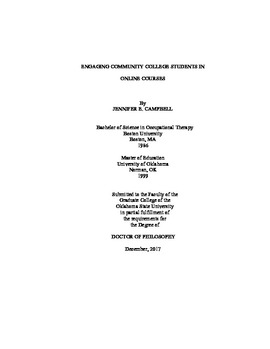| dc.contributor.advisor | Moore, Tami | |
| dc.contributor.author | Campbell, Jennifer E. | |
| dc.date.accessioned | 2018-06-18T16:02:31Z | |
| dc.date.available | 2018-06-18T16:02:31Z | |
| dc.date.issued | 2017-12 | |
| dc.identifier.uri | https://hdl.handle.net/11244/300085 | |
| dc.description.abstract | The percentage of students enrolled in online courses is higher for community college students than it is for students attending four-year colleges and universities (National Center for Educational Statistics, 2017a). The trend is concerning as community college students who as a whole, are at risk for success are enrolling in courses that have low completion rates. | |
| dc.description.abstract | The Kuh et al., (2007) Framework for What Matters to Student Success postulates that student engagement is a crucial factor in success. Engagement occurs when students spend time and effort on academic pursuits (Kuh et al. 2007). High-Impact Practices are those that institutions commit to which are proven to engage students and improve student outcomes (Kuh, 2008). The purpose of this study was to investigate whether the final grade in an online course is higher when the institution implements a program to engage online students. | |
| dc.description.abstract | Participants in this study were divided into three experimental groups. One group received personalized emails from an experienced online faculty member with suggestions of study strategies and reminders of college services available to help students succeed. This group of participants was invited to contact the faculty member if they had any questions about online courses or the college. A second group received the same notes from the Online Learning Department, but the emails were generic, and the participants were advised to call the college help desk if they had any questions. The third group of students served as the control group. The final grades were analyzed to determine if there were differences between the groups as well as if a participant's age or prior GPA influenced the reaction to the increased engagement. The findings did not show any significant relationships. However, a pattern emerged for students who were new to college. Participants who received generic support earned higher grades than those who received no additional support, and the participants who received personalized support achieved at an even higher level. Further study on students new to college might provide strategies to supports students new to college who enroll in online courses, increasing their chances of success. | |
| dc.format | application/pdf | |
| dc.language | en_US | |
| dc.rights | Copyright is held by the author who has granted the Oklahoma State University Library the non-exclusive right to share this material in its institutional repository. Contact Digital Library Services at lib-dls@okstate.edu or 405-744-9161 for the permission policy on the use, reproduction or distribution of this material. | |
| dc.title | Engaging community college students in online courses | |
| dc.contributor.committeeMember | Barnes, Laura | |
| dc.contributor.committeeMember | Foubert, John | |
| dc.contributor.committeeMember | Ormsbee, Chris | |
| osu.filename | Campbell_okstate_0664D_15501.pdf | |
| osu.accesstype | Open Access | |
| dc.type.genre | Dissertation | |
| dc.type.material | Text | |
| thesis.degree.discipline | Educational Leadership and Policy Studies | |
| thesis.degree.grantor | Oklahoma State University | |
